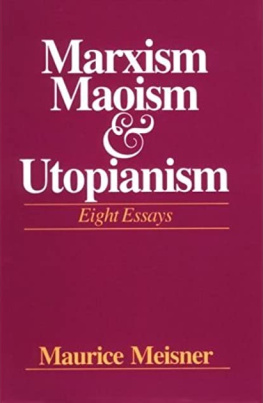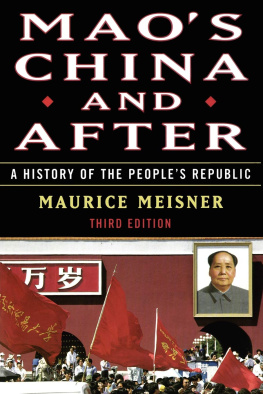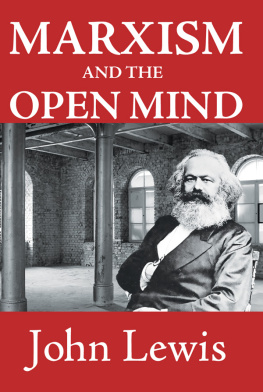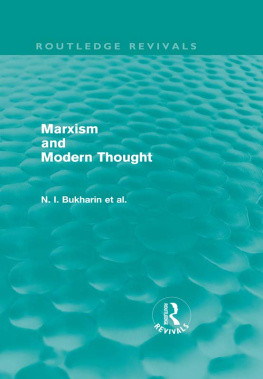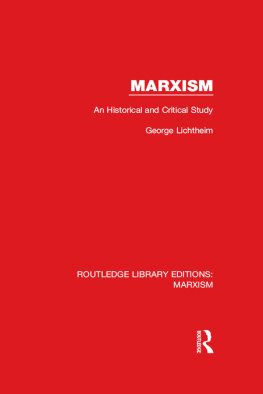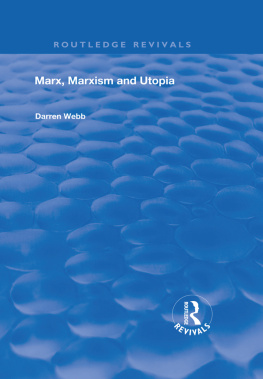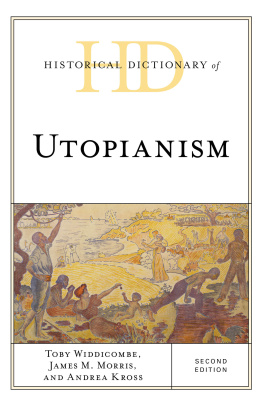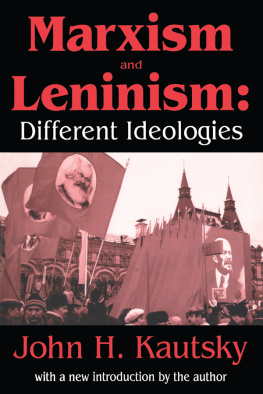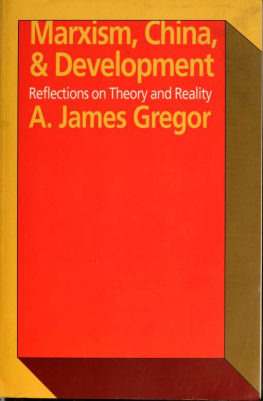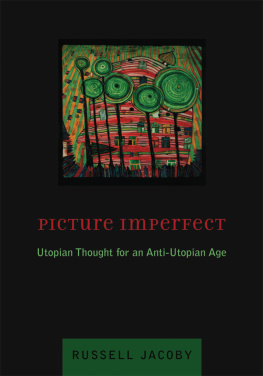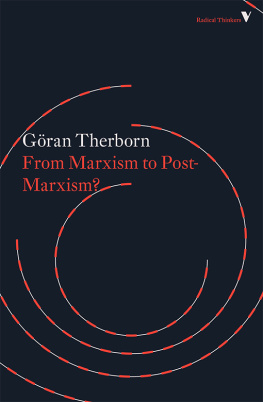MARXISM MAOISM AND UTOPIANISM
Eight Essays
Maurice Meisner
Published 1982
The University of Wisconsin Press
114 North Murray Street
Madison, Wisconsin 53715
The University of Wisconsin Press, Ltd.
1 Gower Street
London WC1E 6HA, England
Copyright 1982
The Board of Regents of the University of Wisconsin System
All rights reserved
First printing
Printed in the United States of America
Library of Congress Cataloging in Publication Data
Meisner, Maurice J., 1931-Marxism, Maoism, and utopianism.
Bibliography: pp. 243250.
Includes index.
1. Mao, Tse-tung, 18931976 Addresses, essays, lectures. 2. Marx, Karl, 18181883 Addresses, essays, lectures. 3. Communism Addresses, essays, lectures.
ISBN 0299084205
Chapter 2, Utopian Socialist Themes in Maoism, was originally published in Peasant Rebellion and Communist Revolution in Asia, John Wilson Lewis, ed. (Stanford, Calif.: Stanford University Press, 1974), pp. 20752, 34045 reprinted with the permission of the publishers, Stanford University Press; 1974 by the Board of Trustees of the Leland Stanford Junior University; Chapter 3, Leninism and Maoism: Some Populist Perspectives on Marxism-Leninism in China, in The China Quarterly 45 (JanuaryMarch, 1971): 236; Chapter 4, Utopian Goals and Ascetic Values in Chinese Communist Ideology, in The Journal of Asian Studies 28.1 (November 1968): 10110; Chapter 5, Images of the Paris Commune in Contemporary Chinese Marxist Thought, in The Massachusetts Review 12.3 (1971): 47997 1971 The Massachusetts Review, Inc.; and Chapter 7, Utopian and Dystopian Elements in the Maoist Vision of the Future, in Radical Visions of the Future, Seweryn Bialer and Sophia Sluzar, eds., (Boulder, Colo.: Westview Press, 1977), pp. 85126, 18892 1977 The Research Institute on International Change, Columbia University.
epub version 1.0
Preface
Is Communism only the piling of brick on brick?
Mao Tse-tung, 1965
On 27 June 1981, on occasion of the sixtieth anniversary of the founding of the Chinese Communist Party, the post-Maoist leaders of the Peoples Republic of China announced their long-delayed assessment of the place of Mao Tse-tung in the history of the Chinese Revolution. The lengthy resolution issued by the Communist Party of China, while concluding that Maos contributions to the Chinese Revolution far outweigh his mistakes, nevertheless sets forth a rather harsh indictment of the final two decades of the late Chairmans rule. The resolution enumerates a long list of leftist errors committed by Mao from the time of the Great Leap Forward campaign to the catastrophe of the Cultural Revolution and its feudal-fascist aftermath. Particularly prominent among the aging Maos mistakes, according to his official assessors, were political and ideological proclivities that Marxists conventionally have labelled utopian and therefore unscientific. Mao, it is charged, overestimated the role of mans subjective will and efforts, he indulged in forms of thinking and practice divorced from reality, and he raised entirely unrealistic expectations of the advent of a communist utopia. Having thereby violated the presumably objective laws of historical development, Mao Tse-tung, from the orthodox Marxist-Leninist perspectives of the current Peking leadership, stands censured for his utopian heresies.
In condemning Maoist utopianism, Chinas present political and ideological leaders were long preceded by Western students of contemporary Chinese history. Since the time of the Great Leap Forward campaign of 1958, most foreign scholars viewed Maos ideas and policies as recklessly utopian, wildly irrational, and wholly incongruous with presumably universal and necessary processes of modern economic and political development. And many other Western observers who found so many virtues in Maoism during the Maoist era have now come to see the errors of their ways (now that the errors have been officially revealed in Peking) and join in the general celebration of the new course followed by Maos successors. Peking and most Western students of the Peoples Republic stand on unaccustomed common ground in praising the pragmatism of Chinas new leaders and their sober pursuit of the Four Modernizations. Consigning Maoist utopianism to the dustbin of history, as is currently fashionable among Pekings leaders and their foreign observers, is of course very much in accord with the general temper of the times. For we live in an age when utopian visions of a future good society have all but vanished in both the industrialized capitalist world and the ostensibly socialist world. The advanced capitalist countries, should they not be crushed under the social weight of their own technologies, suffer from a cruel paradox, which has been acutely diagnosed by Frank and Fritzie Manuel:
Just when magnificent new scientific powers have become available to us, we are faced with a paucity of invention in utopian modalities Scientists tell us that they can now outline with a fair degree of accuracy the procedures necessary to establish a space colony in a hollowed comet or asteroid. But when it comes to describing what people will do there, the men most active in the field merely reconstruct suburbia garden clubs and all in a new weightless environment.
The Manuels have good and more than sufficient reason to lament the discrepancy between the piling up of technological and scientific instrumentalities for making all things possible, and the pitiable poverty of goals.
No less pitiful is the impoverishment of goals in Communist-ruled lands. Socialist revolutions, which in decades past seemed to many the hope of the future, clearly have failed to produce socialist societies. Marxist visions of a communist utopia have given way to the goals of modern economic development and official Marxist-Leninist doctrines, correspondingly, have degenerated into little more than ideologies of modernization, their wearisome ideological rhetoric barely disguising the banal nationalist aims of their bureaucratic authors. The socialist countries, all latecomers on the world industrial scene, mimic their capitalist predecessors in the piling up of technological instrumentalities, playing out a historical parody in tattered Marxian garb.
Our time is one when Communist and capitalist lands alike suffer from a pitiable poverty of goals and an appalling lack of vision. And for those who envision a future for mankind that embraces more than the assumed rationality of modern industrial society, it is perhaps not the time to hasten to applaud the demise of utopianism in China or elsewhere. The Maoist brand of utopianism may no longer be of any political relevance, but it does have a historical significance, and its significance deserves to be understood in terms that are historically and humanly comprehensible. To dismiss the utopianism of Mao Tse-tung as an unfortunate historical aberration whether the dismissing is done by orthodox Marxist-Leninists or by orthodox theorists of the modernization process does little to further the understanding of the past, nor does it yield such guidance as the past might have to offer for those who still hope and strive for a new and better future.
This book is an inquiry or more precisely, an interrelated series of inquiries proceeding from different intellectual and historical points of departure into the utopian aspects of the Maoist mentality. It is primarily a study in the intellectual history of Maoism, confined to (and limited by), it should be emphasized, the pursuit of themes and issues directly relevant to the utopian side of Mao Tse-tungs thought. There are, of course, many other sides of Mao, but it is not the aim of the present inquiry to discuss Maoist theory as a whole or the political practice which flowed from it. Yet the utopian side of Mao is not historically inconsequential, and this volume, it is hoped, is not simply a study in the history of ideas. For it was precisely Maos utopian departures from Marxist and Leninist orthodoxies, it is argued in the chapters that follow, which were essential in transforming the inherited body of Marxist theory into a doctrine relevant to the needs of revolution in the modern Chinese historical environment. And, it is further argued, it was Maos visionary utopianism in the years after 1949 which had a great deal to do with molding much of what has been distinctive about the post-revolutionary history of the Peoples Republic. Maoist utopianism is not an exotic intellectual curiosity but a historical phenomenon intimately related to the social and political history of modern and contemporary China.
Next page
